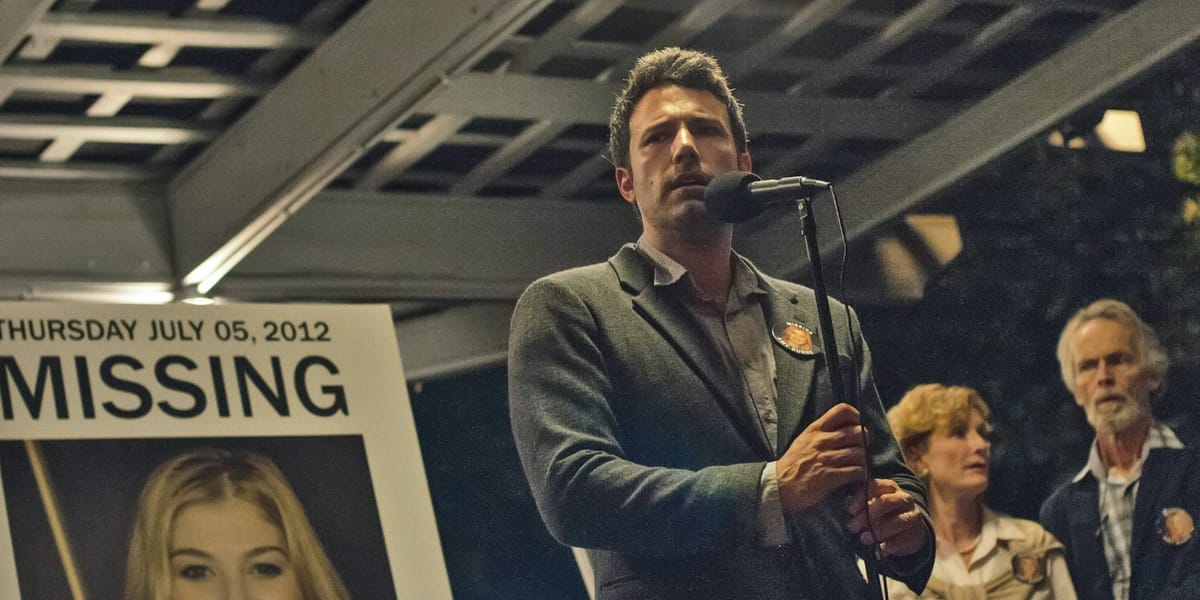Delightfully Detestable Characters Make “Gone Girl” a Movie to Remember

Amy Dunne is gone before we ever meet her in “Gone Girl,” initiating a frenzied witch-hunt where all fingers point at her husband, Nick Dunne (Ben Affleck). The film, directed by David Fincher, is a faithful adaptation of Gillian Flynn’s 2012 novel of the same name. It’s told from the perspective of our supposed wife-killer in the days after Amy (Rosamund Pike) goes missing, as well as from the perspective of Amy Dunne herself as she reminisces about a joyful marriage gone awry via the chapters in her diary during the years and weeks leading up to her disappearance. It’s a film about marriage, crime and the modern media’s response to tragedy — and ultimately, it’s about lying. All the characters lie — to each other, to themselves, and, most strikingly, to the audience.
Immediately after Nick Dunne walks into his Missouri home on his fifth wedding anniversary, welcomed by a shattered coffee table and a missing wife, suspicion falls on him. The police question him, his sister questions him, all of America questions him and so do we. This development surprises no one: Nick is a man tormented by his mother’s death, by his father’s dementia, by the disintegration of his career and by his own lies. As an audience, we’re supposed to empathize with Amy. She grew up under the shadow of “Amazing Amy,” her fictional alter ego/character from a novel that her parents created and made millions off of (“Your parents plagiarized your childhood?” “Improved upon,” Amy corrects, dryly). Amy has also given up her career and moved to the “navel of this great country” for her husband, Nick: a man who was supposed to save her, yet ended up neglecting and abusing her. Our sympathies are also guided by Amy’s impassioned narrations and by Nick’s dodgy behavior – though the eeriness of the cinematography tells us not to trust first impressions.
The film is rife with cold, blue-toned long shots of bland midwestern suburbia as well as an unsettling sense of anticipation at every cut; even cutesy date scenes between Nick and Amy appear robotic and apprehensive. Rosamund Pike brings a different dimension to Amy than I had previously expected: she seems older and less likeable than Flynn’s original. Although I didn’t like this, I’ll admit that it added to the film’s creepy, artificial tone. Ben Affleck’s performance is disaffected and frustratingly detached; we’d like him, if he’d be honest with us for once. In fact, every character puts on a mask for the audience, and we spend the entirety of the movie uncovering layer after ugly layer.
The story almost tries to do too much: it’s at once a scathing social critique, a look into the human psyche, and a sexy thriller-mystery (the latter of these attempts outshines the rest). The crimes are just a little too unbelievable, though I suppose Hollywood demands this.
Our obsession over the cardinal question of whether or not Nick Dunne killed his wife supersedes any nuanced evaluation of interpersonal relationships. I watched the film on the edge of my seat, and though I was intrigued by Amy’s flashbacks, I found them interesting insofar as they helped me solve the mystery of her disappearance. I was less concerned with why, rather than how, Amy disappeared.
“Gone Girl” leaves you breathless and uncomfortable; it gives no sugary-sweet respite, no sense of security, and no true homecoming. The viewer becomes trapped within the throes of a story without a neat conclusion, just as its characters are trapped within their marriages and their families. Nick Dunne cannot escape neither his egoistic demons nor the literal binds of his marriage, while Amy, who tries to escape the lies that she has lived as “Amazing Amy,” the perfect wife with the perfect husband, constructs the most inescapable, irreversible façade of all.
David Fincher realizes the cool apprehension of the book expertly, but if anything’s brilliant, it’s Gillian Flynn’s original story. Gillian Flynn is known for creating refreshingly detestable characters, and “Gone Girl” is no exception. There is no real way to write about “Gone Girl” without giving away the most innovative aspect of the story. I will say this, however: when we read books and watch movies, we expect the story presented to us to be true. In other words, fiction is already imaginary, so we expect no reason for the narrators to lie to us. Despite this expectation, “Gone Girl” pulls the rug out from under the audience — and you’ll never see it coming.
“Gone Girl” is now playing at Cinemark Hampshire Mall.





Comments ()